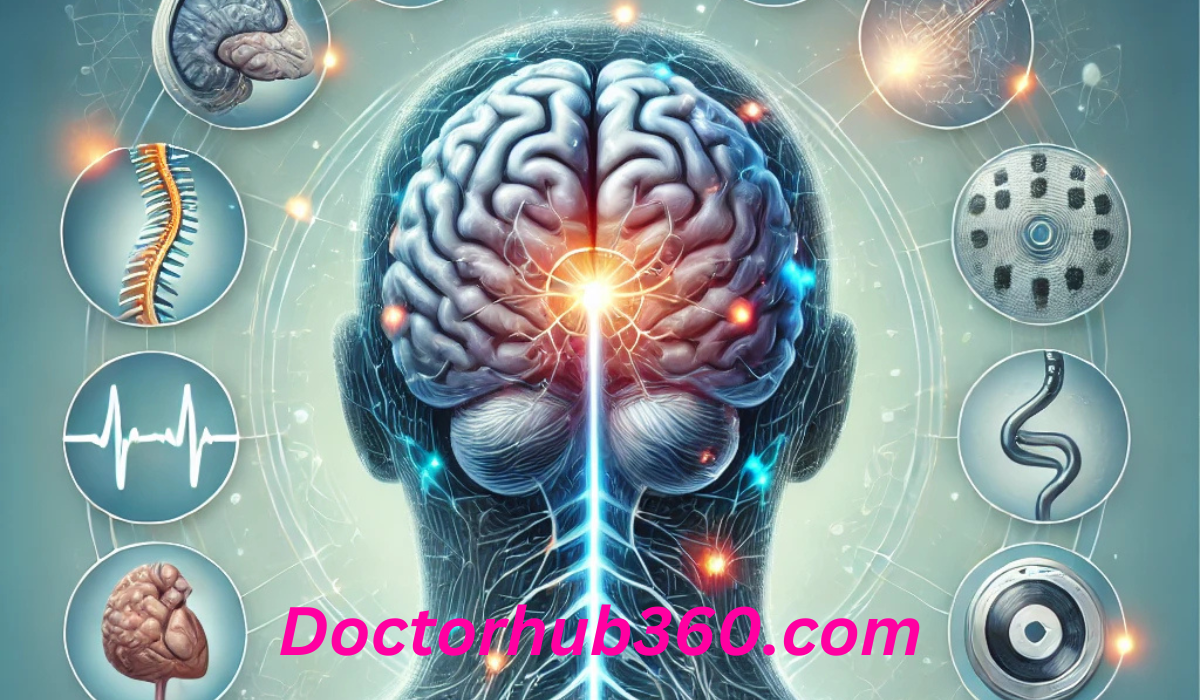Every year, millions of people worldwide face the challenges of Doctorhub360.com Neurological Diseases A Beginner’s Guide, conditions that directly affect the brain, spinal cord, and nerves. These disorders not only impact physical health but can also influence emotional well-being and quality of life. If you’re new to understanding these conditions, don’t worry. We’ll explain them in simple terms.
This guide will explain neurological diseases, their causes and symptoms, and how they’re diagnosed and managed. We’lll also include frequently asked questions to help you better understand and address common concerns. With doctorhub360.com neurological diseases resources,you’lll gain insight into these complex conditions and how to support yourself or a loved one effectively.
What Are Doctorhub360.com Neurological Diseases?
Neurological diseases are medical conditions that affect the central and peripheral nervous systems. These systems include the brain, spinal cord, cranial nerves, and peripheral nerves, which control and coordinate yourbody’ss functions.
Some common Doctorhub360.com Neurological Diseases include:
- Stroke – Disrupting blood flow to the brain can lead to loss of function.
- Alzheimer’ss Disease – A type of dementia that impacts memory and cognitive function.
- Parkinson’ss Disease – A disorder affecting movement due to reduced dopamine levels in the brain.
- Epilepsy – A condition that causes recurrent seizures.
- Multiple Sclerosis (MS) – A disease where the immune system attacks the nervous system, causing communication problems between the brain and body.
These conditions can vary significantly in their severity and impact. Some may cause mild symptoms, while others could result in significant disability.
Common Causes of Doctorhub360.com Neurological Diseases
Neurological diseases often have complex causes resulting from genetic, environmental, and lifestyle factors. Here are some of the most common contributors:
1. Genetics
Certain conditions, such asHuntington’ss disease or some forms of epilepsy, can be inherited. Family history plays a significant role in the likelihood of developing certain neurological conditions.
2. Trauma
Accidents causing head or spinal cord injuries can lead to neurological conditions such as traumatic brain injury (TBI) or paralysis. It’ss vital to take precautions, like wearing helmets and seatbelts, to reduce the risk of such injuries.
3. Aging
Natural ageing processes can contribute to diseases like Alzheimer’s and and Parkinson’s. Over time, the brain and nervous system may lose some functionality.
4. Lifestyle Factors
Unhealthy habits, such as smoking, excessive alcohol consumption, poor diet, and lack of exercise, can increase the risk of conditions like stroke and migraines.
5. Environmental Exposure
Toxins like lead or mercury can cause long-term neurological damage. Workplace safety protocols and environmental awareness are crucial in preventing such exposures.
Recognizing the Symptoms of Neurological Diseases
Symptoms of neurological conditions vary widely depending on the specific disease and the areas of the nervous system affected. Some signs to watch out for include:
- Persistent headaches or migraines
- Muscle weakness or loss of coordination
- Seizures or shaking
- Numbness or tingling sensations
- Memory loss or cognitive decline
- Difficulty speaking or understanding speech
- Vision problems or loss of balance
Assuming you experience any of these side effects, it is fundamental for look for clinical consideration expeditiously. Early conclusion and intercession can have a huge effect.
How Are Neurological Diseases Diagnosed?
Diagnosing a neurological condition typically involves multiple steps and tests to pinpoint the issue accurately. Standard diagnostic methods include:
- Medical History and Physical Exams – Doctors will discuss symptoms, family history, and lifestyle factors.
- Imaging Tests – Tools like MRIs and CT scans provide detailed brain and spinal cord images.
- Electrodiagnostics – Tests like EEGs and EMGs measure the brain’s nerves’ electrical activity.
- Blood Tests can identify infections or metabolic disorders contributing to neurological symptoms.
Treatment and Management Options
While neurological diseases can be challenging, medical advancements have made many conditions manageable. Treatment options vary depending on the specific diagnosis and severity but may include:
- Medications – Drugs can help manage symptoms, reduce inflammation, or prevent disease progression.
- Therapies – Physical, occupational, or speech therapies can support recovery and improve functionality.
- Lifestyle Changes – A healthy diet, regular exercise, and stress management can significantly improve quality of life.
- Surgery – For some conditions, such as epilepsy or brain tumours, surgical options can provide relief or address the root cause of the problem.
Support networks and resources like doctorhub360.com neurological diseases provide tools and information to help patients and caregivers.
FAQs About Neurological Diseases
1. Can neurological diseases be prevented?
While not all neurological diseases are preventable, maintaining a healthy lifestyle—like eating a balanced diet, exercising, and prioritizing mental health can lower your risk. Regular checkups can also help detect potential issues early.
2. Are all neurological diseases genetic?
Not all neurological diseases are genetic—environmental factors, lifestyle habits, or ageing cause many problems. However, family history can increase the risk for certain conditions.
3. What should I do if I suspect I have a neurological issue?
Consult your primary care doctor or a neurologist if you notice concerning symptoms. Early diagnosis and intervention can improve treatment outcomes.
4. How can I support a loved one with a neurological disease?
Be patient and empathetic. Please encourage them to follow medical advice, attend treatments, and maintain a healthy lifestyle. Connect them to resources like doctorhub360.com neurological diseases for additional support.
5. Where can I learn more about managing neurological conditions?
Visit doctorhub360.com for in-depth guides, health tips, and expert resources tailored to neurological diseases.
Take the First Step Toward Understanding
Living with or supporting someone with a neurological condition can feel overwhelming, but knowledge is power. By understanding the causes, symptoms, and treatments of neurological diseases, you’re better equipped to take control and seek the help needed.


[…] Neurological diseases encompass a wide range of disorders affecting the nervous system, which includes the brain, spinal cord, and peripheral nerves. These conditions can significantly impact an individual’s quality of life, making awareness and understanding crucial. […]